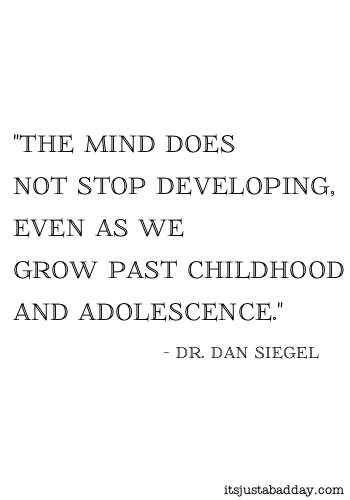Take a deep breath and center yourself to be present in this moment.
I had two favorite lectures during Medx – Dr. Dan Siegel’s Master Class Workshop and Dr. Bonnie Feldman’s Autoimmune presentation. This post is the first of a few that I’ve written about what I’ve learned from Dr. Siegel.
I was accepted into the master class prior to the conference and couldn’t have been more excited about it! To be 100% honest, I hadn’t followed Dr. Siegel’s work prior to this conference, but I can 100% tell you that I can’t wait to read ALL of his research now. I even had the chance to participate in a google hangout for Stanford’s Engage and Empower MOOC a few weeks back to have an open discussion surrounding Dr. Siegel’s work. (Check out the great discussion we had around Compassion, Connection & Engagement!)
Interpersonal neurobiology was a term that I wasn’t familiar with before. I’ve had an idea about the concept prior to hearing Dr. Siegel speak, but wasn’t familiar with the scientific term. Neurobiology refers to the brain as a whole, but interpersonal neurobiology hypothesizes that the mind is NOT JUST brain activity. Dr. Siegel explained that individuals in psychology get upset about this hypothesis, but he argues that subjective experience is NOT the same as neurons firing actions and people are invested in their real life experiences. If interpersonal neurobiology didn’t exist how could we explain empathy? Dr. Siegel explained that there has to be a connection between the mind and the brain.
[su_quote cite=”Dr Dan Siegel” url=”http://www.drdansiegel.com/pdf/Chapter%20excerpt%20from%20TDM%202nd%20Ed..pdf”]On the brain side of mental life, current neuroscience reveals the connection between brain structure and function, and provides us with new insights into how experience shapes mental processes.3 By altering both the activity and the structure of the connections between neurons, experience directly shapes the circuits responsible for such processes as memory, emotion, and self-awareness. We now know, too, that experience and the firing of neurons can alter the regulatory molecules that control gene expression—a process called “epigenesis.”4 These epigenetic changes reveal the powerful ways in which experience modifies how the brain develops, sometimes across the lifespan. In fact, recent studies in neuroplasticity reveal how the brain continues to modify its structural connections with experience throughout life.5 Moreover, studies of evolution suggest that our mammalian brains are profoundly social, and that relationships have a huge impact on neuronal function from the earliest days of our lives.[/su_quote]
If there is a connection between our mind and our brain,
does that mean we affect the development of our own brain?
[su_quote cite=”Dr Dan Siegel” url=”http://www.drdansiegel.com/pdf/Chapter%20excerpt%20from%20TDM%202nd%20Ed..pdf”]Mind, brain, and relationships are not three separate elements. Instead, we are proposing that they are “three aspects of one reality”—that is, energy and information flow. Just as we have heads and tails of one coin, we can have many facets of one entity. This aspect of mind regulates the flow of energy and information as it is shared within relationships and moves through the physical mechanisms of the brain, the embodied neural connections within the extended nervous system distributed throughout the whole body.[/su_quote]
There are some things that we are genetically predisposed to, but can we change our genetics? Can we change how our genes are expressed?
Dr. Siegel talked about how genes have 2 major functions
1. They are information templates which are to be passed on to the next generation
2. They have a ‘transcription’ function encoded in their DNA, which determines how the proteins will be synthesized ultimately affecting when, which and how they will be expressed.
According to Dr. Siegel, this transcription function is DIRECTLY influenced by our personal experiences. Therefore, we may have genes that are determined to play out one way, but our experiences in life can alter how they’re expressed thus directly impacting how our brain interacts neurologically! How crazy is that?!
I’m sure we can all come up with situations when our mentality was affected by energy coming from other place or person. Every piece of energy, situation, relationship, etc that we come into contact with is continually impacting the development of our brain.
Basically, Dr. Siegel is telling us that our mind is the result of all the relationships and the experiences we have over time.
[su_quote cite=”Dr Dan Siegel” url=”http://www.drdansiegel.com/pdf/Chapter%20excerpt%20from%20TDM%202nd%20Ed..pdf”]Relationship experiences have a dominant influence on the brain because the circuits responsible for social perception are the same as or tightly linked to those that integrate the important functions controlling the creation of meaning, the regulation of bodily states, the modulation of emotion, the organization of memory, and the capacity for interpersonal communication. Interpersonal experience plays a special organizing role in determining the development of brain structure early in life and the ongoing emergence of brain function throughout the lifespan.[/su_quote]
Below is the wonderful keynote speech that Dr. Dan Siegel gave during Medx 2014. From this presentation, and from his master class, I took away 2 main points that I’d like to share with you.
1. A mindfulness practice helps us develop ‘mindsight’. Mindsight is the ability to see the internal world of self and others. Once we’re able to monitor our inner workings, we can stabilize and regulate, working towards complete integration (aka health!).
2. Relationships directly affect the molecular structure of the body and, as a result, can have a profound impact on healing.
Because both of these 2 points are pretty heavy, today AND the next 2 Medx Mondays will be dedicated to Dr. Dan Siegel and his amazing research!
I strongly urge you to watch his speech if you have the chance. He’s extremely interesting and amazingly thought-provoking!
Dr. Siegel has many different videos on his website that are worth check out. He also has authored numerous resources and I’m slowly ticking my way through each of them. Next up I want to read: The Healing Power of Emotion: Affective Neuroscience, Development & Clinical Practice.
Stay tuned to be amazed by Dr. Seigel’s powerful research
Wishing You A Pain Free Day!


